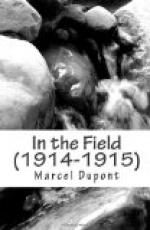At the very moment when I was turning back, and was beginning the hateful passage for the third time, the enemy gunners, changing their objective, aimed at the bridge, and the shrapnel bullets began their disturbing music once more. Could any situation be more execrable than ours—to be upon a bridge as thin as a thread, hanging as by a miracle over a deep river, to see this bridge enfiladed by heavy musketry fire and to be obliged to walk our horses over the 200 yards which separated one bank from the other? If we had been on foot, so that we could have run and expended our strength in getting under cover—since we could not use it to defend ourselves—we should not have complained. But to be mounted on good horses, which in a few galloping strides could have carried us behind the rampart of houses, and to be obliged to hold them back instead of spurring them on, was very unpleasant, and made us feel foolish.
I looked at the four brave Chasseurs in front of me. They instinctively put up their shoulders as high as they could as if to hide their heads between them. But not one of them increased his pace. Not one of them looked round at me to beg me to give orders for a quicker advance. And what a concert was going on all the time! Whilst the horses’ hoofs were beating out low and muffled notes, the bullets flew above us and around us, with shrill cracklings and whistlings which were anything but harmonious. Happily the firing was distant and disgracefully bad, for at the pace we were travelling we must have offered a very convenient mark. Another 20 yards! Ten more! At last we were safely under cover!
I communicated the Colonel’s orders to the Captain, who came to join us, and directed us to occupy the little garden of a fair-sized house situated just on the edge of the Marne and the most advanced of the small group of buildings on the left-hand side of the bridge. After lodging the horses in an alley between the house and an adjoining shanty I went to reconnoitre my ground. The house was a rustic restaurant, which in the summer no doubt afforded the inhabitants an object for a walk. On passing along the terrace leading to the river I found the disorder usual in places that have been occupied by the Germans; tables overturned, bottles broken, the musty smell of empty casks, and broken crockery.
The little garden did not offer much protection for my men. However, crouching behind a kind of breastwork of earth, which shut it off from the woods, they were able, at least, to hide themselves from view. I at once posted my sharpshooters, sent out a patrol on foot as far as the entrance to the wood, and then turned my attention to what was happening near the bridge.




